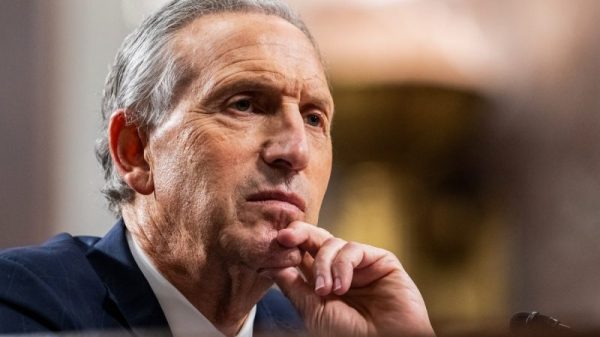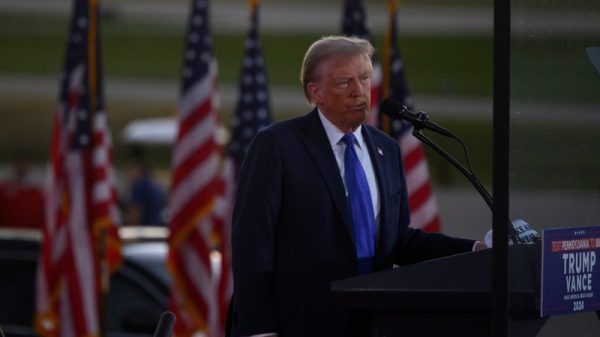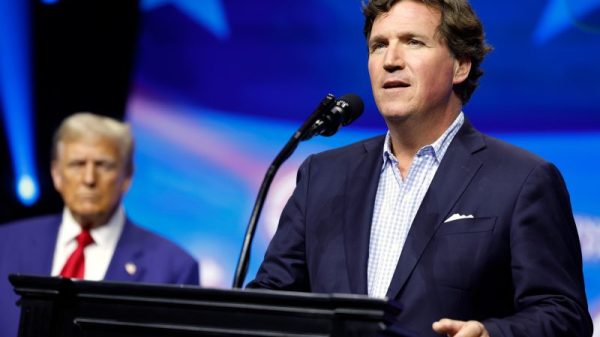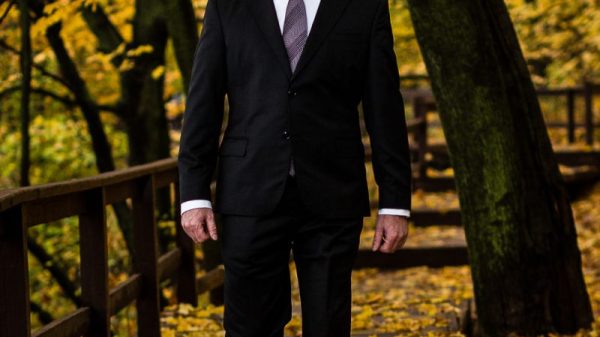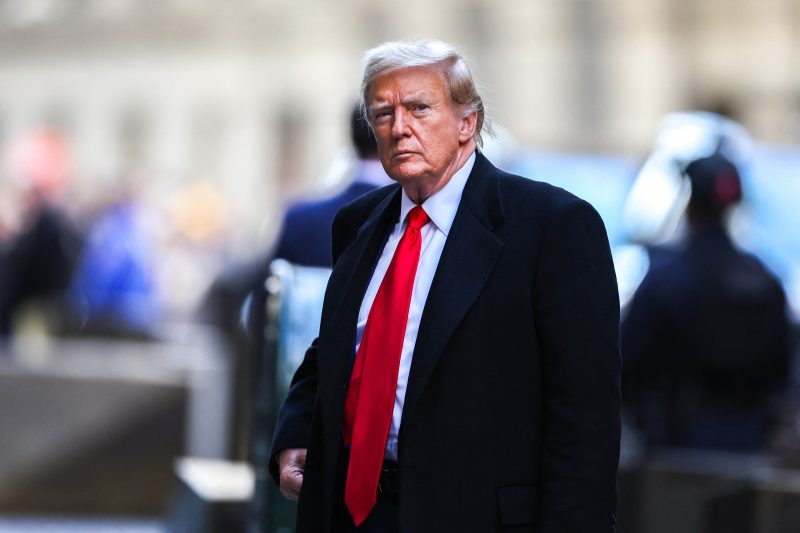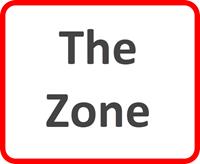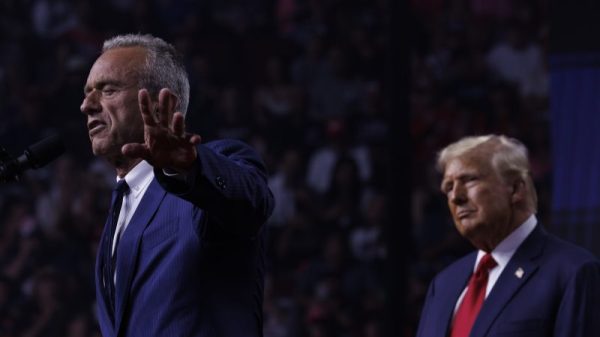Former president Donald Trump is ramping up efforts to disparage judges overseeing his criminal and civil cases — reprising a long-standing strategy as a high-profile trial draws near and prompting growing concerns from legal experts and an expanded gag order late Monday.
The presumptive Republican presidential nominee’s approach, part of a broader election-year attempt to portray the judicial system as weaponized against him, was evident in a slew of attacks over the weekend. Such broadsides, which Trump has often lobbed without evidence for his claims, have raised worries about the safety of judges and threaten to undermine faith in the court system, some legal experts said Monday.
Trump’s personal attacks against the daughter of the New York judge overseeing a hush money case prompted the judge to expand an existing gag order to include his family and the district attorney’s family.
On social media over the weekend, Trump wrote that New York State Supreme Court Justice Juan Merchan, who is overseeing his New York hush money criminal trial that is scheduled to start April 15, “should be immediately sanctioned and recused.” The attack came days after Trump personally attacked Merchan’s daughter, calling her a “Rabid Trump Hater” and suggesting that the judge was “compromised” because of her work for a Democratic-aligned digital marketing company.
Trump called New York State Supreme Court Justice Arthur Engoron, who ordered a nearly half-billion-dollar judgment against Trump, “corrupt” and claimed that his credibility had been “shattered.” And in a lengthy post on Easter Sunday, Trump wrote in all caps: “Happy Easter to all, including crooked and corrupt prosecutors and judges that are doing everything possible to interfere with the presidential election of 2024, and put me in prison.”
Manhattan District Attorney Alvin Bragg alluded to Trump’s repeated attacks last week in asking Merchan to confirm whether the limited gag order he had imposed on Trump bars the former president from attacking the judge’s family. On Monday, he submitted an additional court filing citing Trump’s most recent public statements and reiterating his request that the judge clarify if the gag order applies to his own family members — and expand it if it doesn’t. The new ruling from Merchan came hours later and alluded to the attacks on his daughter.
“It is no longer just a mere possibility or a reasonable likelihood that there exists a threat to the integrity of the judicial proceedings,” Merchan wrote. “The threat is very real. Admonitions are not enough, nor is reliance on self-restraint.”
In their own Monday filing, Susan Necheles and Todd Blanche, Trump’s lawyers, argued that Trump has clear rights protecting his speech as a citizen and candidate.
“Under these circumstances, President Trump must be permitted to speak on these issues in a manner that is consistent with his position as the leading presidential candidate and his defense, which is not intended to materially interfere with these proceedings or cause harm to anyone,” the filing said.
Facing 88 charges across four criminal cases, Trump has made presenting himself as the victim of a weaponized judicial system a central focus in his bid for a second White House term, turning his criminal indictments into a rallying cry that helped end the GOP primary swiftly. It’s less clear how that message, with attacks on the judicial system once unheard of by a major presidential candidate, will factor into the general election.
The cases Trump is facing charge him with falsifying records to allegedly cover up a hush money payment to an adult-film actress during the 2016 presidential election; mishandling classified documents and obstructing government efforts to retrieve them; and interfering with the 2020 election results. Local authorities brought two of the cases against Trump with no evidence of coordination, and a special counsel acting independently of the White House brought the two federal cases against him.
Legal experts and judges are voicing alarm about Trump’s comments on judges, cases and defendants prosecuted in connection with the Jan. 6, 2021, attack on the U.S. Capitol, whom the former president has sought to glorify as “hostages.”
“The theme for Trump since the start of all of this has been there are two different games: one is political and one is courtroom and he’s constantly playing one rather than the other,” said Kenneth White, a former federal prosecutor in California who specializes in free speech issues. “It’s all part of a strategy which is sort of delegitimizing the entire system, delegitimizing the court system, and any judge who purports to rule on him.”
The Trump campaign did not respond to a request for comment.
A Washington Post analysis of Trump’s social media posts since the start of his campaign in late 2022 showed that he has gone after judges or their family members by name 138 times. The weeks of March 24 and March 17, respectively, included the second- and fourth-highest number of posts attacking judges overall. Trump criticized judges most frequently during the week of Jan. 7, with 14 individual attacks, nearly all targeted at Engoron.
Trump’s statements are part of a years-long pattern of attacking members of the judiciary in often-personal terms. In 2016, Trump attacked Judge Gonzalo Curiel, who oversaw a case related to Trump University, suggesting that Curiel couldn’t be impartial because of his ethnicity and because Trump promised to build a wall on the border with Mexico. Trump argued that Curiel’s judgment was clouded because “he’s a Mexican.” Curiel, whose parents are from Mexico, was born in Indiana.
Trump’s attacks also come amid growing concerns about the safety of federal judges. A Reuters analysis found that threats against federal judges have more than doubled since late 2020, when Trump significantly increased his criticism of the judiciary.
In January, Engoron received a bomb threat to his Long Island home, right before closing arguments for Trump’s civil fraud case were set to begin. In Georgia, Fulton County Superior Court Judge Scott McAfee, who is presiding over a Trump criminal case involving allegations related to overturning the 2020 election results, has also faced threats, including a swatting incident at his Atlanta-area home in January. A spokesperson for the responding local police department said the investigation had been turned over to the FBI.
“I’m very concerned. I think that the rise in threats to the judiciary is a direct consequence of the rhetoric that Donald Trump uses,” said Barbara McQuade, a law professor at the University of Michigan and a former U.S. attorney nominated by then-President Barack Obama. “When he goes after judges, he accuses them of engaging in election interference. These are public servants doing their jobs.”
She added, “The danger in this rhetoric is that someone out there who is perhaps somewhat unhinged will hear it as a call to action.”
U.S. District Judge Reggie B. Walton, who was appointed by presidents Ronald Reagan and George W. Bush, recently granted an interview with CNN, an unusual move for a sitting federal judge, to denounce Trump’s attacks against Merchan and his daughter.
“When judges are threatened, and particularly when their family is threatened, it’s something that’s wrong and should not happen,” Walton told CNN’s Kaitlan Collins. “It is very troubling because I think it is an attack on the rule of law.”
Trump has faced several limited gag orders amid his legal entanglements. Merchan issued his initial gag order barring Trump from discussing witnesses and other people involved in the New York hush money case.
Trump was also barred from speaking about Engoron’s court staff during a civil trial last year, after he attacked a clerk. Meanwhile, U.S. District Judge Tanya S. Chutkan, who is overseeing Trump’s criminal election interference case in Washington, issued a gag order protecting witnesses and court staff.
Trump’s attorneys tried to get Merchan removed from the case last year, citing — among other reasons — the nature of his daughter’s career as grounds to believe the jurist’s fairness could not be guaranteed. In its recusal motion, the defense noted that the campaign of President Biden and Vice President Harris was a client, along with other prominent Democratic candidates. Merchan denied the motion after consulting with an advisory committee that did not see grounds for his recusal based on the Trump submission.
Trump “has failed to demonstrate that there exists concrete, or even realistic reasons for recusal to be appropriate, much less required on these grounds,” Merchan wrote in his August decision.
Devlin Barrett, Spencer S. Hsu and Amy Gardner contributed to this report.









